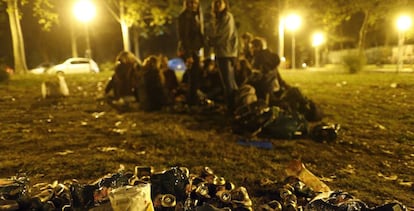Spanish foundation launches campaign on dangers of teen drinking
Foundation tackling drug and alcohol abuse launches campaign on dangers of teenage drinking
A 2014 survey carried out by the state-run National Drugs Plan among school students aged from 14 to 18 showed that more than 37,000 drank on a daily basis, with more than 285,000 taking up drinking within the last year. Almost 490,000, or 22%, had been drunk within the previous 30 days.

Growing concern about widespread alcohol abuse among Spanish teenagers, Spain’s FAD, a foundation that tackles drug and alcohol addiction, has launched a campaign to raise awareness of the problem.
There is no point in playing the blame game as if this were only their problem
Ignacio Calderón, director general, FAD
The campaign comes two months after a 12-year-old girl died in Madrid from alcohol poisoning. “We want people who do not have experience of these events to understand what is going on,” said Ignacio Calderón, the FAD’s director general. He calls the campaign an “action plan” to bring together civil society and the different levels of government.
Figures suggest that the average age most Spaniards take their first drink is between 13 and 14.
More than 710,000 of those surveyed by the National Action Plan on Drugs indulged in binge drinking during the weekend, meaning they consumed in excess of five drinks in a short period of time. A recent survey carried out by EL PAÍS showed that at least 5,000 minors received hospital treatment for alcohol abuse in 2015: “the tip of the iceberg,” says Asís Babín, the Health Ministry’s delegate on the National Action Plan on Drugs.
“The banalization of alcohol reflects a generalized banalization in society,” the official warns, highlighting the importance of combatting stereotypes such as “the funny drunk”.
Figures suggest around one-in-five teenagers get drunk at least once a month
“There is no point in playing the blame game as if this were only their problem,” says Calderón. “For adults, the reality of alcohol consumption by minors is a disgrace. We have to get out there and get this under control and try to reduce the reality of this phenomenon.”
A FAD statement describes Spain’s alcohol problem as “complex,” arguing society as a whole as a responsibility. It adds that current legislation is “insufficient”, adding that education and awareness are the long-term solution.
While Calderón has applauded Heatlh Ministry initatives to introduce a new law on drinking by minors, he is opposed to the idea of bans on the so-called botellón, impromptu parties organized by young people in the street "in a country where there is a fiesta every 14 minutes."
Consuming alcohol in public areas has been forbidden in Madrid and many cities since 2002; the only exceptions are in sidewalk cafés and during local fiestas. In 2012, the Madrid regional government raised the fines and eliminated the possibility of community work, while the new Citizen Safety Law passed by Congress in April establishes penalties of between €100 and €600 for drinking alcohol inside establishments or public transportation when it poses a serious disturbance of the peace.
English version by Nick Lyne.
Tu suscripción se está usando en otro dispositivo
¿Quieres añadir otro usuario a tu suscripción?
Si continúas leyendo en este dispositivo, no se podrá leer en el otro.
FlechaTu suscripción se está usando en otro dispositivo y solo puedes acceder a EL PAÍS desde un dispositivo a la vez.
Si quieres compartir tu cuenta, cambia tu suscripción a la modalidad Premium, así podrás añadir otro usuario. Cada uno accederá con su propia cuenta de email, lo que os permitirá personalizar vuestra experiencia en EL PAÍS.
¿Tienes una suscripción de empresa? Accede aquí para contratar más cuentas.
En el caso de no saber quién está usando tu cuenta, te recomendamos cambiar tu contraseña aquí.
Si decides continuar compartiendo tu cuenta, este mensaje se mostrará en tu dispositivo y en el de la otra persona que está usando tu cuenta de forma indefinida, afectando a tu experiencia de lectura. Puedes consultar aquí los términos y condiciones de la suscripción digital.









































